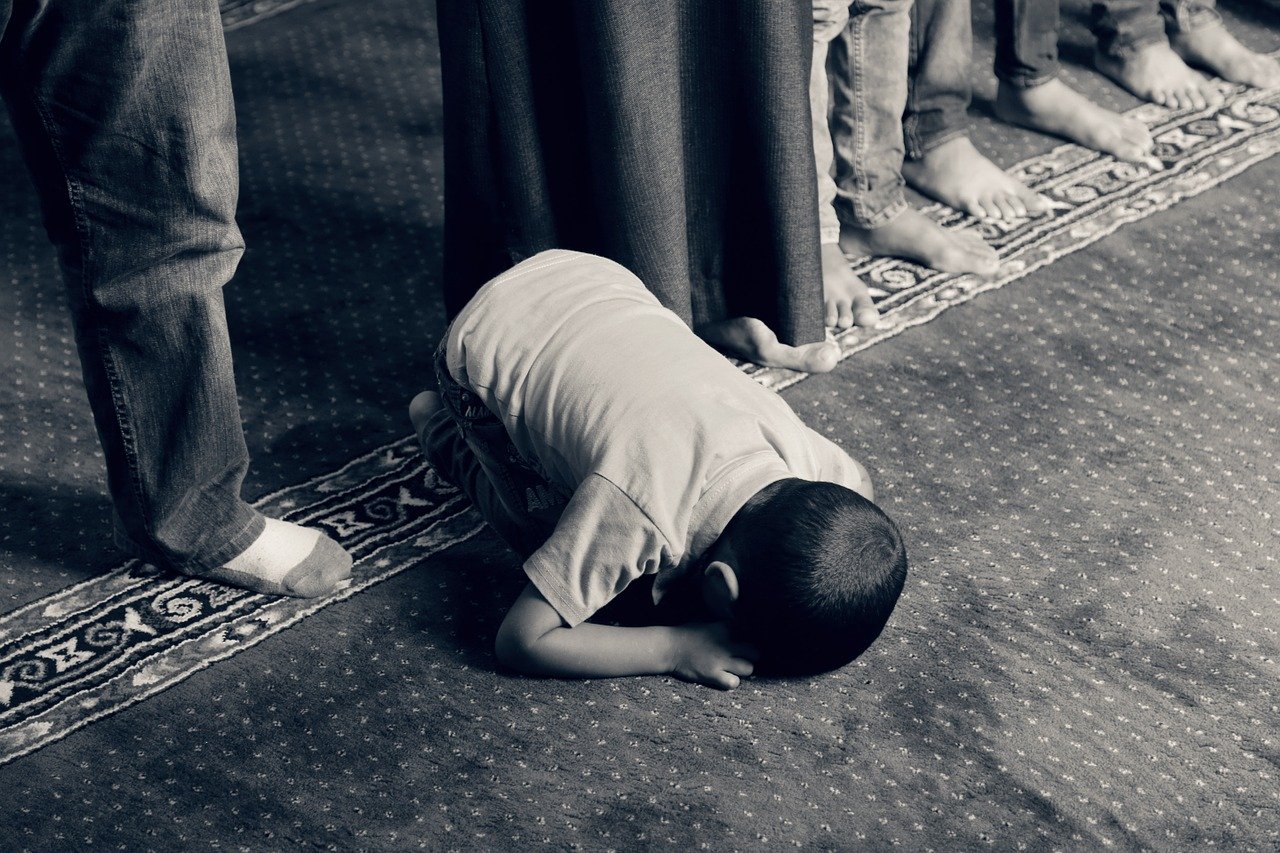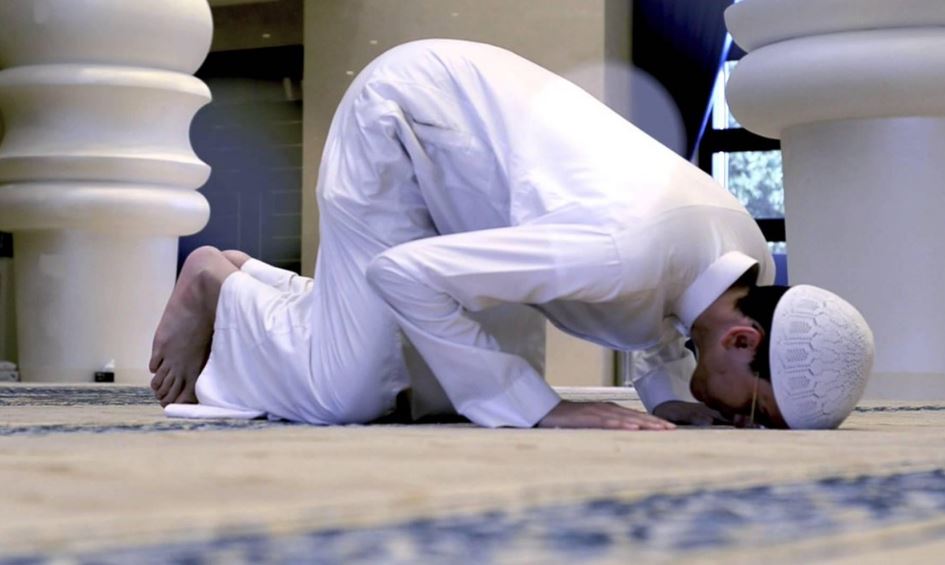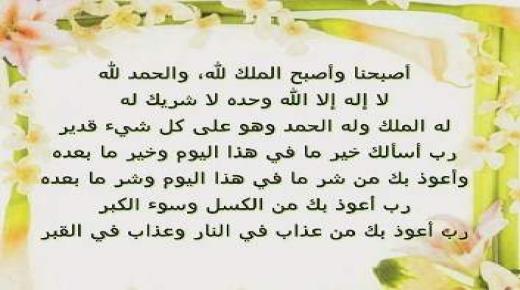
We have in the Messenger of God (may God’s prayers and peace be upon him) a good example, as he was constantly remembering God (Glory be to Him), and his tongue did not stop. The Mother of the Believers, Aisha (may God be pleased with her), said: “The Prophet (peace and blessings of God be upon him) used to remember God at all times Narrated by Muslim. Mrs. Aisha did not see the Messenger of God except that he remembers his Lord at all times and at everything he does and in every place except in places where it is not appropriate to mention the name of God, including in the open. That is, in the place where a person spends his needs.
Prayer remembrance
The entire prayer is a remembrance of God from its beginning to its end, but the Messenger of God (may God’s prayers and peace be upon him) taught us specific remembrances for each action in it so that the credit and reward may be achieved by following the Prophet in all his words and deeds in fulfillment of his command (may God bless him and grant him peace) in his saying that Malik bin Al-Huwairith transmitted to us ( May God be pleased with him) He said: The Messenger of God (peace and blessings of God be upon him) said: “Pray as you have seen me praying, and when the time for prayer comes, let one of you call for prayer, and let the eldest of you lead you.” .
Remembrance before the start of prayer
The Companions were following the Prophet (may God bless him and grant him peace) with great precision, to follow his example, and they hinted at him for a pause after the takbeer and before the reading. So they asked him what he says about it. So he taught them, and we taught them after them, eight formulas for the opening prayer, from which the Muslim chooses or says what suits him according to what is available to him.
Remembrance of the opening prayer
Formula XNUMXOn the authority of Abu Hurairah (may God be pleased with him) who said: “The Messenger of God (peace and blessings of God be upon him) used to remain silent between the takbeer and the recitation – he said, ‘I think it is. God, silence you between the takbeer and the recitation, what do you say? He said: (I say: O God, distance me from my sins, as You distanced between the east and the west, O God, purify me from sins as the water is pure defilement, O Allah, wash away my sins with water, snow and hail) Narrated by Al-Bukhari and Muslim.
second formulaOn the authority of Aisha (may God be pleased with her), she said: “The Messenger of God (may God’s prayers and peace be upon him) was when the prayers are open, he said:“ Glory be to God, and praise you,
third formulaOn the authority of Ali bin Abi Talib (may God be pleased with him) on the authority of the Messenger of God (may God bless him and grant him peace): “When he stood up to pray, he said: (I turned my face to the One Who created the heavens and the earth as upright, and I am not of the polytheists. وَمَحْيَايَ، وَمَمَاتِي لِلَّهِ رَبِّ الْعَالَمِينَ، لَا شَرِيكَ لَهُ، وَبِذَلِكَ أُمِرْتُ وَأَنَا مِنَ الْمُسْلِمِينَ، اللهُمَّ أَنْتَ الْمَلِكُ لَا إِلَهَ إِلَّا أَنْتَ أَنْتَ رَبِّي، وَأَنَا عَبْدُكَ، ظَلَمْتُ نَفْسِي، وَاعْتَرَفْتُ بِذَنْبِي، فَاغْفِرْ لِي ذُنُوبِي جَمِيعًا، إِنَّهُ لَا يَغْفِرُ الذُّنُوبَ إِلَّا أَنْتَ، وَاهْدِنِي لِأَحْسَنِ الْأَخْلَاقِ لَا يَهْدِي لِأَحْسَنِهَا إِلَّا أَنْتَ، وَاصْرِفْ عَنِّي سَيِّئَهَا لَا يَصْرِفُ عَنِّي سَيِّئَهَا إِلَّا أَنْتَ، لَبَّيْكَ وَسَعْدَيْكَ وَالْخَيْرُ كُلُّهُ فِي يَدَيْكَ، وَالشَّرُّ لَيْسَ إِلَيْكَ، أَنَا بِكَ وَإِلَيْكَ، تَبَارَكْتَ وَتعاليتَ، أَسْتَغْفِرُكَ وَأَتُوبُ إِلَيْكَ) رواه مسلم والنسائي، وتسُن هذه الصيغة في استفتاح قيام الليل As Ibn Al-Qayyim said.
Fourth formAbu Salama bin Abd al-Rahman bin Awf told me, he said: “I asked Aisha, the mother of the believers, with what was the Prophet of God (may God’s prayers and peace be upon him) open his prayer when he said it?” قالَتْ: كانَ إذَا قَامَ مِنَ اللَّيْلِ افْتَتَحَ صَلَاتَهُ: “اللَّهُمَّ رَبَّ جِبْرَائِيلَ، وَمِيكَائِيلَ، وإسْرَافِيلَ، فَاطِرَ السَّمَوَاتِ وَالأرْضِ، عَالِمَ الغَيْبِ وَالشَّهَادَةِ، أَنْتَ تَحْكُمُ بيْنَ عِبَادِكَ فِيما كَانُوا فيه يَخْتَلِفُونَ، اهْدِنِي لِما اخْتُلِفَ فيه مِنَ الحَقِّ بإذْنِكَ، إنَّكَ تَهْدِي مَن تَشَاءُ إلى صِرَاطٍ straight".
Fifth formulaOn the authority of Ibn Abbas (may God be pleased with them), he said: “The Prophet (may God’s prayers and peace be upon him) was if you find from the night. فِيهِنَّ، أَنْتَ الحَقُّ، وَوَعْدُكَ الحَقُّ، وَقَوْلُكَ الحَقُّ، وَلِقَاؤُكَ الحَقُّ، وَالجَنَّةُ حَقٌّ، وَالنَّارُ حَقٌّ، وَالنَّبِيُّونَ حَقٌّ، وَالسَّاعَةُ حَقٌّ، اللَّهُمَّ لَكَ أَسْلَمْتُ، وَبِكَ آمَنْتُ، وَعَلَيْكَ تَوَكَّلْتُ، وَإِلَيْكَ أَنَبْتُ، وَبِكَ خَاصَمْتُ، وَإِلَيْكَ حَاكَمْتُ، فَاغْفِرْ لِي مَا قَدَّمْتُ وَمَا You are my God, there is no god but You) Narrated by Al-Bukhari and Muslim.
Sixth formulaIt is one of the formulas of the supplication of the opening of the Companions (may God be pleased with them), and the Prophet approved them, for Anas (may God be pleased with him): (صلى الله عليه وسلم) صَلَاتَهُ، قَالَ: (أَيُّكُمُ الْمُتَكَلِّمُ بِالْكَلِمَاتِ؟) ، فَأَرَمَّ الْقَوْمُ -يعني: سكتوا- ، فَقَالَ: (أَيُّكُمُ الْمُتَكَلِّمُ بِهَا؟ فَإِنَّهُ لَمْ يَقُلْ بَأْسًا) ، فَقَالَ رَجُلٌ: جِئْتُ وَقَدْ حَفَزَنِي النَّفَسُ فَقُلْتُهَا، فَقَالَ: ( I have seen twelve angels hastening it, which of them will take it away.” Narrated by Muslim and Al-Nasa’i.
Seventh formula: Also from the sayings of the Companions, on the authority of Ibn Omar (may God be pleased with him) who said: “While we were praying with the Messenger of God (may God bless him and grant him peace), a man from among the people said: God is most great, and praise be to God abundantly, and Glory be to God. Morning and evening, and a messenger said God (may God bless him and grant him peace): (Who said such-and-such a word?) A man from the people said: “It is me, O Messenger of God.” He said: (I am amazed at her, the gates of heaven were opened for her). Ibn Omar said: “I have not left them since I heard the Messenger of God (may God bless him and grant him peace) say that.” Narrated by Muslim.
Eighth formulaThe formula of Tahajjud is especially long, and the Messenger of God (may God bless him and grant him peace) did not use it in the written prayers, so as not to make it difficult for people.
Aisha was asked what the Messenger of God, may God’s prayers and peace be upon him, used to say when he got up at night and what he used to open. The account is ten.
What is said in bowing?

If a Muslim recites the opening supplication, then Al-Fatihah and the verses that he chooses for his prayer, he bows, and when he bows, he says one of these formulas:
The first formula: To limit himself to saying “Glory be to my Lord the Great” when it was narrated on the authority of Hudhayfah (may God be pleased with him): He (may God bless him and grant him peace) used to say in his bowing: “Glory be to my Lord the Great…” Narrated by Muslim and Al-Tirmidhi.
Second formula: It was narrated on the authority of Ali (may God be pleased with him) that he said: “The Messenger of God (may God bless him and grant him peace) used to say when he bowed: “Oh God, I bowed to You, and in You I believed, and in You I surrendered.
Third formula: It was reported on the authority of Aisha (may God be pleased with her) that she said: The Prophet (may God bless him and grant him peace) used to say in his bowing and prostration: “Glory be to You, O God, our Lord, and I praise You, O God, forgive me.” Narrated by Al-Bukhari.
Fourth formula: It was also reported on the authority of the Mother of the Believers, Aisha (may God be pleased with her): The Messenger of God (may God bless him and grant him peace) used to say in his bowing and prostration: (Glory be to Him, Holy One, Lord of the Angels and the Spirit) Narrated by Muslim
These formulas are numerous, and all of them are proven from the Messenger of God (may God bless him and grant him peace) so that the Muslim can move between them, so that his tongue does not get used to a specific formula and repeats it with preoccupation of the mind and without focus.
What to say when rising from bowing؟
There are also several versions of what a Muslim says after rising from bowing:
Formula XNUMX: That the Muslim confine himself to saying “O God, our Lord, and to You be praise.” This is what Abu Hurairah (may God be pleased with him) said: that the Messenger of God (may God’s prayers and peace be upon him) said: (If the imam says, God hears those who praise Him, then say, “O God, our Lord, to You be praise.” For whoever’s saying coincides with the saying of the angels, his past sins will be forgiven.” Narrated by Al-Bukhari.
second formulaIt was reported on the authority of Abdullah Ibn Abi Awfa (may God be pleased with him): The Prophet (may God’s prayers and peace be upon him) used to say: (O God, praise be to You that fills the heavens and fills the earth and fills whatever else You will, O God, purify me with snow, hail and cold water, O God, purify me from Sins and transgressions are as a white garment is purified from dirt) Narrated by Muslim.
Third formula: It came on the authority of Abu Saeed Al-Khudri (may God be pleased with him) who said: The Messenger of God (may God’s prayers and peace be upon him) when he raised his head from bowing, would say: “Our Lord, praise be to You that fills the heavens and the earth, and fills whatever You want after the people of praise and glory. The most worthy of what the servant said. And we are all Your servants, O Allah, there is no objection to what You have given, and there is no giver to what You have withheld, and the seriousness of you is of no use.” Narrated by Muslim.
Fifth formulaIt is from the sayings of the Companions, and the Prophet approved it, approving it, and praising the one who said it. On the authority of Rifa’a bin Rafi’ (may God be pleased with him), he said: One day we were praying behind the Prophet (may God bless him and grant him peace), and when he raised his head from the rak’ah, he said: (God listens to those who praise Him) He said: A man behind him: Our Lord, and to You be praise, much, good and blessed praise. When he finished, he said: (Who is speaking?) He said: I am. He said (I saw thirty-few angels rushing to see which of them wrote it down first), narrated by Al-Bukhari.
What is said in prostration?

Although all prayer is remembrance of God and although the best words of remembrance of God are the Holy Qur’an, there is a prohibition against reading the Qur’an while bowing and prostrating. : “Except that I was forbidden to recite the Qur’an while bowing or prostrating, so as for bowing; So exalt the Lord in it, and as for prostration; So strive hard in supplication, so be sure that your prayers will be answered.” narrated by Muslim.
When the scholars were asked whether it is permissible to say the supplications that were mentioned in the Holy Qur’an while prostrating, such as “Our Lord, forgive me and my parents and the believers on the Day when the reckoning is established,” they answered that there is nothing wrong with it, but if the supplication is intended by it, not the reading of the Qur’an.
Prostration is for supplication, and therefore the supplications that the Messenger (may God bless him and grant him peace) supplicated in prostration increased, because all supplications for any good in this world and the Hereafter are legitimate, especially in prostration, as it was reported on the authority of Abu Hurairah (may God be pleased with him) that the Messenger of God (peace and blessings of God be upon him) said : The closest a servant is to his Lord while he is prostrating, so supplicate abundantly. Narrated by Muslim.
Formulas of supplication in prostration that were reported from the Prophet (may God bless him and grant him peace):
- Formula XNUMXOn the authority of Ali (may God be pleased with him): “..and when he prostrated, he said: O God, to You I prostrated, and in You I believed, and to You I submitted. My face prostrated to the One who created it and fashioned it and created its hearing and sight. Blessed be God, the best of creators.” Narrated by Muslim.
- second formulaOn the authority of Aisha (may God be pleased with her), she said: The Prophet (may God bless him and grant him peace) used to say in his bowing and prostration: (Glory be to You, O God, our Lord, and I praise You, O God, forgive me) Narrated by Al-Bukhari.
- third formulaOn the authority of Abu Hurairah (may God be pleased with him), that the Messenger of God (may God’s prayers and peace be upon him) used to say in his prostration: “Oh God, forgive me for all of him, and he will be forgiven, narrated by Muslim.
- Fourth formula: On the authority of Aisha (may God be pleased with her), she said: The Messenger of God (peace and blessings of God be upon him) would often say in his bowing and prostration: “Glory be to You, O God, our Lord, and with Your praise, O God, forgive me.” The Qur'an is interpreted.
- Fifth formula: عَنْ عَائِشَةَ (رضى الله عنها)، قَالَتْ: فَقَدْتُ رَسُولَ اللهِ (صلى الله عليه وسلم) لَيْلَةً مِنَ الْفِرَاشِ، فَالْتَمَسْتُهُ، فَوَقَعَتْ يَدِي عَلَى بَطْنِ قَدَمَيْهِ، وَهُوَ فِي الْمَسْجِدِ، وَهُمَا مَنْصُوبَتَانِ، وَهُوَ يَقُولُ: “اللَّهُمَّ أَعُوذُ بِرِضَاكَ مِنْ سَخَطِكَ، وَبِمُعَافَاتِكَ مِنْ Your punishment, and I seek refuge in you from you, I cannot count your praise, you are as you have praised yourself) Narrated by Muslim.
- Sixth formula: On the authority of Aisha (may God be pleased with her), that the Messenger of God (may God bless him and grant him peace) used to say in his bowing and prostration: “Glory be to the Holy One, Lord of the angels and the spirit); narrated by Muslim.
- Seventh formula It is shared in bowing and prostrating, on the authority of Awf bin Malik Al-Ashja’i (may God be pleased with him) I spent one night with the Prophet (may God bless him and grant him peace) and he stood up and recited Surat Al-Baqarah. He does not pass by a verse of mercy but stops and asks, and does not pass by a verse of punishment but stops and seeks refuge. He said: “Then He bowed as long as he had risen, saying in his bowing: (Glory be to the Possessor of might, kingdom, pride and greatness) Then he prostrated as long as he had risen, then he said in his prostration the same) Narrated by Abu Dawud
What is said between the two prostrations
Between the two prostrations is reserved for supplication only, and there are several formulas for it, including:
The first formula: Limiting yourself to the repeated supplication, “Lord, forgive me,” on the authority of Hudhayfah (may God be pleased with him) who said: The Prophet (may God’s prayers and peace be upon him) used to say between the two prostrations: (Lord, forgive me, Lord, forgive me). Narrated by Abu Dawood and Women's and Ibn Majah.
Second formula: In it there is an addition to supplication that came on the authority of Ibn Abbas (may God be pleased with them both) that the Prophet (peace and blessings of God be upon him) used to say between the two prostrations: (O God, forgive me, have mercy on me, guide me, guide me, guide me, teach me righteousness, and enlighten me).
Third formula: There are additions that make the supplication with seven words due to the multiplicity of narrations of this hadith.
What is said in the tashahhud
What is said in The first tashahhud
In the first tashahhud of all prayers except Fajr, which is the first half of the tashahhud, on the authority of Ibn Masoud (may God be pleased with him) who said: The Prophet (may God’s prayers and peace be upon him) said: (If one of you sits in prayer, let him say: Greetings to God, prayers, and good things. Peace be upon you, O Prophet, and God’s mercy and blessings. Peace be upon us and upon the righteous servants of God. I bear witness that there is no god but God, and I bear witness that Muhammad is His servant and Messenger.) Bukhari and Muslim.
What is said in the last tashahhud
What is said in it is the complete tashahhud, which is the middle or first tashahhud, to which prayers are added to the Messenger (may God’s prayers and peace be upon him) in the Abrahamic formula. On the authority of Ka’b bin Ajrah (may God be pleased with him): The Prophet (may God’s prayers and peace be upon him) came out to us and we said: O Messenger of God He taught us how to greet you, so how do we pray for you? ", Bukhari and Muslim.
What is said in supplication after the last tashahhud and before the salutation
It is Sunnah for a Muslim to supplicate before the salutation and after the end of the tashahhud, an absolute supplication in which he can choose whatever supplication he wants, and including the supplication that is restricted to seeking refuge from four things and other supplications, which will be clarified in the noble hadiths:
The restricted supplication seeking refuge from the four, on the authority of Abu Hurairah (may God be pleased with him) who said: The Messenger of God (peace and blessings of God be upon him) said: (If one of you has finished the last tashahhud, let him seek refuge with God from four: from the torment of Hell, from the torment of the grave, and from the trial of the face. and death, and from the evil of the Antichrist.” Narrated by Al-Bukhari and Muslim.
Among the restricted supplications is also what was narrated on the authority of Ali (may God be pleased with him): The Prophet (peace and blessings of God be upon him) used to say between the tashahhud and the tasleem: (O God, forgive me for what I have done before and for what I have delayed, for what I have concealed and for what I have announced and what I have been extravagant, and for what You are more knowledgeable than me. The backside there is no god but You) Narrated by Muslim.
The absolute supplication: On the authority of Ibn Masoud (may God be pleased with him), he said: The Prophet (peace and blessings of God be upon him) taught them the tashahhud, then he said at the end of it: “Then he chooses a supplication that he likes best, and he supplicates.” Narrated by al-Bukhari and Muslim.
Remembrance after every prayer

After completing the prayer, the Messenger of God taught us supplications in which we pray to thank God for granting us success in establishing the prayer, including asking forgiveness for what was in it of oversight, forgetfulness, or shortcoming, and it is also in several forms that the Muslim chooses from or says to her according to what he has time and prepares his mind:
- The first formula: On the authority of Thawban (may God be pleased with him), who is the servant of the Messenger of God, he said: When the Prophet (peace and blessings of God be upon him) left his prayer, he would ask forgiveness three times, and he would say: (Oh God, You are peace and from You is peace, You are blessed, O Possessor of Majesty and Honor) Narrated by Muslim.
- Second formula: And it is on the authority of Abdullah Ibn Al-Zubayr (may God be pleased with them both) who said: The Messenger of God (may God’s prayers and peace be upon him) used to rejoice after every prayer when he greeted with these words: (There is no god but God, alone, without partner. There is no power but God, there is no god but God, and we worship none but Him. To Him belongs grace, to Him belongs grace, and to Him is good praise.
- third formulaOn the authority of Al-Mughirah bin Shu’bah (may God be pleased with him): The Messenger of God (may God’s prayers and peace be upon him) when he finished the prayer, said: “There is no god but God, alone, without partner. It is given for what you withheld, and the grandfather does not benefit from you.” Narrated by Al-Bukhari and Muslim.
Remembrance at the end of prayer
How does a Muslim complete the prayer?
- He recites Ayat al-Kursi for its great virtue after every written prayer. On the authority of Abu Umamah (may God be pleased with him) who said: The Messenger of God (may God bless him and grant him peace) said: “Whoever recites Ayat al-Kursi after every written prayer, nothing will stand between him and entering Paradise except that he dies.” It was narrated by Al-Nisa’i and Ibn Al-Sunni, and this is a great commandment, as the death of a Muslim will inevitably be between two prayers, so after each written prayer, read the verse of Al-Kursi to be a renewal of your covenant with God in anticipation of your death before the time for the next prayer comes, and its virtue is that you will enter Paradise once you die only, and this is a promise from the Messenger God (may God bless him and grant him peace).
- He recites the two exorcisms (Al-Falaq and An-Nas), on the authority of Uqbah (may God be pleased with him) who said: “The Messenger of God (may God bless him and grant him peace) commanded me to recite the exorcist after every prayer.” Narrated by Abu Dawud and Al-Tirmidhi.
- He glorifies, praises, and exalts each one thirty-three times and completes a hundred. On the authority of Abu Hurairah (may God be pleased with him): The Messenger of God (peace and blessings of God be upon him) said: “He who praises God arranges every prayer thirty-three times, praises God thirty-three times, and pronounces the greatness of God thirty-three times, for that is nine.” Ninety, and he said the perfect hundred: There is no god but God alone, He has no partner, His is the kingdom and His is the praise, and He is capable of everything. His sins were forgiven, even if they were like the foam of the sea.” Narrated by Muslim.
- He supplicates to God like the hadith of Muadh or the hadith of Sa’d, or both of them together. On the authority of Muadh (may God be pleased with him): The Messenger of God (may God bless him and grant him peace) said to him: (O Muadh, do not leave behind every prayer saying: O God, help me to remember You, thank You, and worship You well. Narrated by Abu Dawud, Al-Nisa’i and Al-Hakim, and on the authority of Saad (may God be pleased with him): The Messenger of God (may God’s prayers and peace be upon him) used to seek refuge after every prayer with these words: “O God, I seek refuge in You from cowardice, and I seek refuge in You from being returned to the worst life, and I seek refuge in You from temptation of the world, and I seek refuge in You from the torment of the grave.” Narrated by Al-Bukhari.


